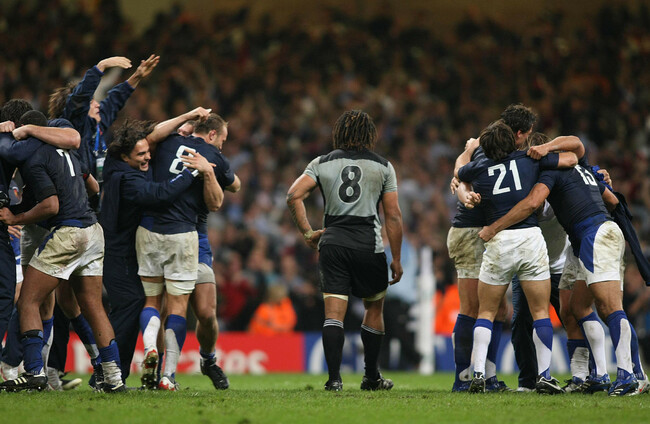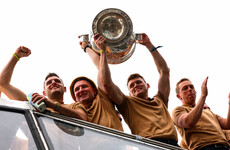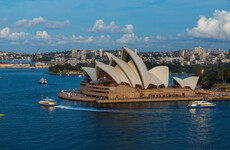THE FOLLOWING PASSAGE is an extract from Gambling For Life by Harry Findlay.
No one knew what to say. Most couldn’t speak anyway.
The drinking had long since stopped. Half-empty glasses stacked up. Harry Findlay was too busy screaming for the All Blacks to go for a last-ditch drop goal to notice exactly what his pals in the corporate box at the Millennium Stadium were doing.
Nearing the bitter end of the 2007 Rugby World Cup quarterfinal in Cardiff between New Zealand (upon whom Harry doted) and France (not the opposition he had been expecting to see at that stage), it was clear that the £2.5 million he had wagered on the All Blacks had gone.
Paul Barber, a Somerset dairy farmer, co-owner with Harry of a very special horse called Denman and one of the invitees for the night, had seen a lot in his life but struggled to relate to the atmosphere in the glass-fronted area that isolated the Findlay party from the rest of the world.
“For months before the match, all we heard about was this great gamble of Harry’s. As the match wore on, you could just tell the French were going to beat them,” Barber said. “I’d never seen a sight like it – grown men so distraught. Some of them were crying! We dispersed very quickly at the end. I couldn’t take it any longer.”
The final shocking score was France 20, New Zealand 18.
Harry had done his bollocks and, as a consequence, had brought a lot of people down with him. “It was the sort of atmosphere you had to escape from,” he admitted.
“If I’d been an innocent bystander, I’d have wanted no part of it either.”
Harry, as usual, felt more for all those he had persuaded to part with their cash on the All Blacks than he did for himself.
Everyone in the company had sacrificed a lot of money – the shock was palpable. But Harry’s loss absolutely dwarfed anyone else’s.
His whole life had been shaped by the need to bet, and here he was, at 45 years of age, knowing that the largest sum he had placed on the outcome of a single sporting event was in someone else’s pocket rather than his. More than half of his entire worth had been obliterated.
Regardless of the manner by which the mighty New Zealanders had fallen foul of the flaky French (the conclusive try was shaped by an illegal forward pass), Harry was suffering.
How could anyone, even someone as unrelentingly positive as Harry Findlay, possibly recover from such a catastrophic blow?
“I was asked dozens of times in the aftermath what was it like to lose £2 million on a rugby match,” Harry said, “but it was difficult to explain. I remembered many times when defeat was harder from both a mental and personal finance point of view. This was a different kind of pain, and with it the general numbing realisation that I’d cost a lot of other people money as well.”
A gambler attracted polar opposite characters, with very little fudging in the margins. Harry knew them as ‘the funkers’ and ‘the begrudgers’.
“The funkers wanted you to win; the begrudgers hoped you’d lose. A or B, simple as that,” he said.
“Charlie, who helped look after our garden when we lived in Bath, was a funker.”
Charlie the gardener – Harry never did know his surname – tended the sprawling Rowas Lodge landscape a couple of times a month, trimming the lawn and shaping the trees before popping into Harry’s office for a cup of tea and the latest gambling gossip.
Invariably, talk would turn to the bets of the moment, and if the discussion centred on a horse, Charlie said he would follow it with interest, though mostly with support more moral than financial.
“Now and again I said: ‘Charlie, this is a nap, have £20 or £30 on,’ and he would, but in general he was happy enough just cheering them on for me,” Harry said. “Bath is one of
the few towns in England where a pub is more likely to show rugby union rather than football, and like most men in the area, Charlie knew his rugby union.
“When I kept harping on about what absolute moral certainties the All Blacks were to win the 2007 World Cup, he didn’t disagree, and, like me, he was a fully paid-up member
of the Dan Carter fan club. Carter was the best fly-half in the world — we all knew it.
“About a week before the tournament began, Charlie asked what were the best odds available on the All Blacks. I said that the Corals price of 4/7 was the way to go. I thought no more of it until I walked into my office the following morning and found a big frozen ice-cream tub on my desk.
“There was no mint choc chip inside, just £28,000 in ice-cold cash. After my missus, Kay, drove me into town as quick as shecould, I swapped it for a betting slip, which was Charlie’s voucher for his £28,000 to win £16,000 on the unbeatable All Blacks.”
Eamonn Willmott woke on the day of the match and was gripped by a sensation of nausea. “I was going to go to Cardiff but I had a weird feeling about the day – as if something not good was going to happen,” said the man who first introduced a 13-year- old Harry to the rudiments of gambling.
“I decided to pull out of the trip. All of Harry’s winnings over the past year had just been doubled up. He’d win 50 grand on a horse, then another, and it would go straight on the All Blacks.”
On the train from Bath to Cardiff, Harry was doing what he did every day, on his mobile betting the horses as the journey unfolded. There was nothing different in his demeanour, he was the usual upbeat, confident Harry.
New Zealand were rugby union’s unstoppable force in 2007. Every reliable signpost acknowledged the likelihood of a blackshirted romp through the World Cup. They possessed in Carter the world’s pre-eminent player, a fly-half of consummate handling skills who had radar in his boots, especially when it came to kicking goals.
Very few punters were backing against New Zealand taking the cup home, but when it came to supporting them with hard cash, no one was more convinced of their tournament-winning potential nor endorsing that judgment as extravagantly as Harry.
“In 2003, I had a hefty bet on them to win the tournament, but I was far from all-in,” he said. “I was a bit of a Carlos Spencer fan, the fly-half before Carter. He was brilliant, an
extrovert performer.
“I likened him to Titus Bramble, the old Newcastle United centre-half. He was a decent player was Titus, but whenever you watched him defend, you knew it was only a matter of time before he’d commit some reckless act. Spencer was the same, an improviser.
“It was 0-0 in the 2003 semi-final against Australia, he had the ball and wanted to do something clever, so he threw an arrow pass crossfield on his own 20-metre line. With New Zealand on top in the early stages, you couldn’t have had imagined a worse
time to take such a liberty.
“Stirling Mortlock made the easiest of interceptions and suddenly the Aussies were 7-0 up. It quite simply changed the tempo of the game, put the All Blacks on the back foot and the Aussies ran out winners, 22-10.”
The first time Harry set eyes on Dan Carter was when he made his debut against Wales in June 2003. The kid scored 20 points and was a real revelation.
“He played a bit in the 2003 World Cup, but by the time the 2007 event came around, he was like the rest of the team, just about unplayable,” Harry said. “The fly-half position seemed even more pivotal in those days. He was the kicker and hardly ever missed.
“I watched a lovely documentary with his modest father, Neville, stood next to the goalposts he’d erected in the garden of the family home in Southbridge. He said that wherever he placed the ball, Dan would make the kick, and talked about just how much his son had practised over the years.
“In the two years leading up to the 2007 finals themselves, I thought the All Blacks were brilliant and timing their challenge to perfection. I also knew their coach Graham Henry wouldn’t leave a stone unturned in his quest for the Holy Grail.
“Over that period of time, I effectively used the All Blacks via Betfair as a high-profit bank account. They may have been 4/7 when the competition started, but I’d managed to have £2.5 million at the average price of 1.78 [just under 4/5]. It was the bet of a lifetime and, for sure, financially it would have put me in a very strong position. To be honest, as much as for the money, I was looking forward to the buzz of cheering them home.”
Gambling For Life by Harry Findlay is published by Trinity Mirror Sports Media. More info here.
The42 has just published its first book, Behind The Lines, a collection of some of the year’s best sports stories. Pick up your copy in Eason’s, or order it here today (€10):














Brilliant read with some great stories about his ups and down..